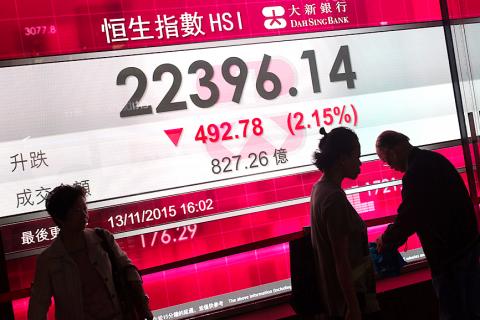Shares in troubled mining giant Glencore PLC yesterday afternoon tumbled 7 percent in Hong Kong, after a rout in London as a sell-off in metals shows no signs of abating.
The losses come as the company, based in Switzerland, struggles under the weight of tens-of-billions-of-US dollars in debt with a global rout in commodities prices hitting its bottom line.
Shares in the firm were down by 6.5 percent to HK$11.80 in the morning. That came after its London-listed stock plunged 7.6 percent on Thursday.

Photo: EPA
The company has lost more than three quarters of its value since listing with much fanfare in London and Hong Kong in May 2011.
The price drop came as copper fell to a six-year low on Thursday, with fears that decreasing demand is a sign that the slowdown in the China economy could be sharper than feared.
The debt-laden firm has faced wild fluctuations in its share price in recent months, with investors fearing that sinking commodity prices would affect its ability to meet outstanding debt obligations.
At the beginning of September it announced a series of drastic moves aimed at cutting its towering US$30 billion debt by a third.
Glencore is selling a share of its future silver output to help reduce its towering debt, as its copper production takes a hit.
One of the world’s largest miners and producers of copper, Glencore yesterday said in a statement that its copper output had slumped 2 percent over the past nine months.
The Switzerland-based company explained the dip with dwindling production at its Alumbrera mine in Argentina, which is reaching the end of its mining life, as well as its suspension of activities at the Katanga mine in the Democratic Republic of Congo.
Most resources-linked firms have taken a hit in recent months as the price of copper, aluminum, iron ore and oil have tumbled.
Alcoa Inc, the largest US aluminum producer, this month also said that it would reduce smelting capacity by 503,000 tonnes and alumina refining capacity by 1.2 million tonnes.
Meanwhile, shares in Noble Group Ltd yesterday tumbled in Singapore after the commodity trader reported a slump in quarterly profit and investors shunned equities linked to raw materials amid a rout in prices.
The shares lost as much as 9 percent to S$0.455, the lowest level since Oct. 9, and traded at S$0.46 at 9:04am.
The company’s stock is this year’s worst performer on the Straits Times Index, down as much as 60 percent.
“It has been a supply-driven bear market in most of the commodities that we’ve been involved in and it’s not obvious that anything has really changed besides the fact that prices are lower,” Noble Group CEO Yusuf Alireza said.
Goldman Sachs Group Inc said only a substantial rise in Chinese metals demand is likely to be sufficient to balance copper and aluminum markets, adding that recent output cut by miners are not large enough to rescue prices.
“While recent supply cuts in copper and aluminum might appear to bring the markets closer to balance, the cuts, in our view, are not sufficient to do so,” Goldman analysts including Max Layton yesterday said in a report.
“It is our view that the supply cuts confirm the bear case for these metals,” they said.
Additional reporting by Bloomberg

To many, Tatu City on the outskirts of Nairobi looks like a success. The first city entirely built by a private company to be operational in east Africa, with about 25,000 people living and working there, it accounts for about two-thirds of all foreign investment in Kenya. Its low-tax status has attracted more than 100 businesses including Heineken, coffee brand Dormans, and the biggest call-center and cold-chain transport firms in the region. However, to some local politicians, Tatu City has looked more like a target for extortion. A parade of governors have demanded land worth millions of dollars in exchange

An Indonesian animated movie is smashing regional box office records and could be set for wider success as it prepares to open beyond the Southeast Asian archipelago’s silver screens. Jumbo — a film based on the adventures of main character, Don, a large orphaned Indonesian boy facing bullying at school — last month became the highest-grossing Southeast Asian animated film, raking in more than US$8 million. Released at the end of March to coincide with the Eid holidays after the Islamic fasting month of Ramadan, the movie has hit 8 million ticket sales, the third-highest in Indonesian cinema history, Film

Taiwan Semiconductor Manufacturing Co’s (TSMC, 台積電) revenue jumped 48 percent last month, underscoring how electronics firms scrambled to acquire essential components before global tariffs took effect. The main chipmaker for Apple Inc and Nvidia Corp reported monthly sales of NT$349.6 billion (US$11.6 billion). That compares with the average analysts’ estimate for a 38 percent rise in second-quarter revenue. US President Donald Trump’s trade war is prompting economists to retool GDP forecasts worldwide, casting doubt over the outlook for everything from iPhone demand to computing and datacenter construction. However, TSMC — a barometer for global tech spending given its central role in the

Alchip Technologies Ltd (世芯), an application-specific integrated circuit (ASIC) designer specializing in server chips, expects revenue to decline this year due to sagging demand for 5-nanometer artificial intelligence (AI) chips from a North America-based major customer, a company executive said yesterday. That would be the first contraction in revenue for Alchip as it has been enjoying strong revenue growth over the past few years, benefiting from cloud-service providers’ moves to reduce dependence on Nvidia Corp’s expensive AI chips by building their own AI accelerator by outsourcing chip design. The 5-nanometer chip was supposed to be a new growth engine as the lifecycle